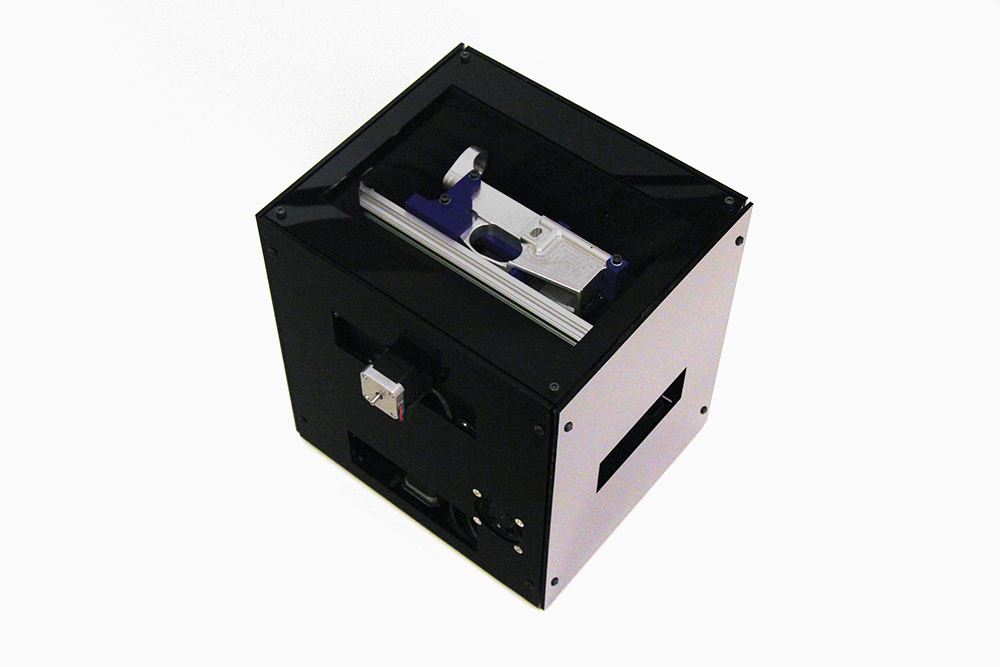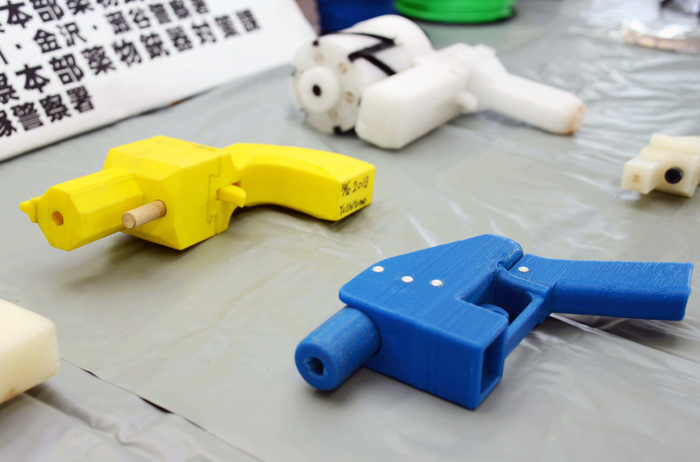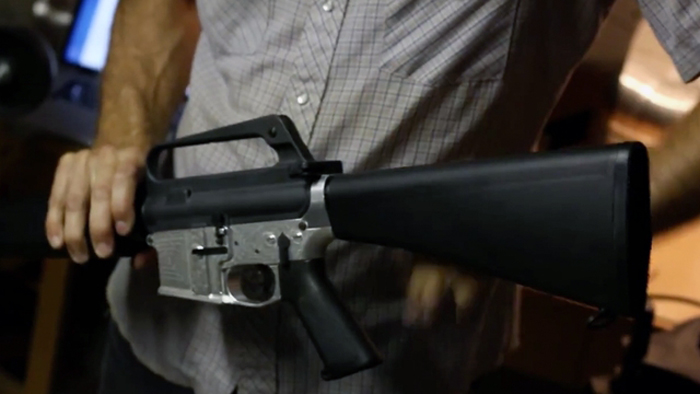The subject of the 3D printed gun is a touchy one, on the one hand representing individual rights for those in favor of the idea and representing collective harm for those opposed. It’s been stated in numerous posts on the subject that obtaining a gun through mainstream distributors like WalMart is probably easier and will yield a much more reliable firearm than 3D printing one on a desktop 3D printer. It’s also been said that there are other ways of making more reliable weapons at home than with a 3D printer. Perhaps it was for this latter reason that gun-making advocacy group Defense Distributed, led by 3D printed gunsmith Cody Wilson, released the Ghost Gunner, a compact CNC mill developed specifically for machining metal parts for untraceable firearm manufacturing. But, now that the Ghost Gunner is ready to ship to those who pre-ordered the machine last October (causing the pre-orders to sell out in less than two days), FedEx has told Defense Distributed that it refuses to ship the device.
This isn’t the first instance of glock-blocking by a major company or organization. When Defense Distributed first published the CAD files for its printable Liberator pistol, it was ordered by the State Department to remove the files from the group’s website, DefCAD.org. Of course, by then, it had already been downloaded 100,000 times and was subsequently shared on various torrent sites. This all took place after Stratasys, from which Wilson had leased an industrial FDM 3D printer to print gun parts, had seized their printer from him when it learned of what it was being used for. Additionally, Defense Distributed was kicked off of Indiegogo when it first launched a crowdfunding campaign in 2012.
Since it first launched, back then, there have been numerous accounts of individual Makers 3D printing their own firearms, with the most notable probably being Yoshitomo Imur who 3D printed five guns, including the Liberator pistol, in Japan, a country with strong firearm regulations, on a desktop 3D printer. Imur has since been sentenced to two-years in jail. More recently, in Australia, a home was raided by Queensland police, who discovered, in addition to a sawed-off rifle, the 3D printed parts to assemble a gun and some 3D printed knuckle dusters.
In response to the 3D printed gun phenomenon, multiple politicians in the US and Australia have sought to pass bills that specifically regulate the 3D printing of guns, including Rep. Steve Israel (D–NY 3rd District), Sen. Kevin de Leόn (D-Los Angeles), and Carl Judge from the PUP Party in Australia. Even outgoing Attorney General Eric Holder expressed his concern over the practice. There are those that have argued that some of this legislation is confused and misdirected, seeking to regulate 3D printing as a technology, when the practice of ghost gun manufacturing is already regulated in some places and needs no technology-specific legislation.
Though much of that legislation has failed to pass – with the exception of Philadelphia, which is, as far as I’m aware, the only municipality to have banned 3D printing guns – large companies have revealed their opinions about the practice. UPS, which has a growing network of 3D printing services across the United States, for instance, told The Daily Dot that it would not 3D print any weapons-related parts. The private postal chain, however, will allow the additive manufacturing of sex toys. Solid Concepts, previous to being purchased by Stratasys, 3D printed a metal pistol, demonstrating the quality of its manufacturing capabilities, which did not reflect an advocacy for home gun printing, but did reflect the company’s ability to 3D print professional-grade firearms with its Federal Firearms License (FFL).
FedEx has added a whole new layer to the story, refusing to ship a low-cost, consumer CNC mill. The Ghost Gunner is a one-foot-cubed $1,500 machine that can definitely be used for purposes other than gunsmithing, with the ability to mill aluminum objects based off of CAD files. And, while there are a number of other low-cost CNC mills already on the market and gun owners have been milling their own untraceable lower receivers for AR-15s, the Ghost Gunner is the only such device specifically marketed towards manufacturing AR-15 rifles.
Originally, Wilson had chosen the private shipper due to its partnership with the NRA (Perhaps surprisingly, FedEx is also a top defense-contractor, receiving hundreds of millions of dollars per year to provide shipping and transportation services to the US military, though I cannot find the specific items that the company ships.). Wilson says last week that a FedEx representative refused to ship the Ghost Gunner, to which he reportedly responded, “This is no big deal, right? It’s just a mill. You guys ship guns. You’ve shipped 3-D printers and mills, right? You’ll ship a drill press, right? Same difference.”
Adam Winkler, a law professor at UCLA and the author of Gunfight: The Battle over the Right to Bear Arms in America, says that producing firearms at home is not illegal. According to Wired, Winkler says, “This is not that problematic. Federal law does not prohibit individuals from making their own firearms at home, and that includes AR-15s.” Wilson gives his opinion to Wired, saying, “They’re acting like this is legal when in fact it’s the expression of a political preference. The artifact that they’re shipping is a CNC mill. There’s nothing about it that is specifically related to firearms except the hocus pocus of the marketing.”
FedEx spokesperson Scott Fiedler has since given Wired a more explicit outline of its policy, “This device is capable of manufacturing firearms, and potentially by private individuals. We are uncertain at this time whether this device is a regulated commodity by local, state or federal governments. As such, to ensure we comply with the applicable law and regulations, FedEx declined to ship this device until we know more about how it will be regulated.”
UPS was obliged to give its own response to the Ghost Gunner policy, with spokesperson Dan Mackin telling Wired, “UPS reserves the right to refuse to provide transportation service for, among other reasons, any shipments that create legal, safety or operational concerns. UPS is continuing to evaluate such concerns with regard to the transportation of milling machines used to produce operable firearms but, at this point in time, will not accept such devices for transportation. UPS is continuing to evaluate such concerns with regard to the transportation of milling machines used to produce operable firearms but, at this point in time, will not accept such devices for transportation.”
Similar to the gun-printing legislation introduced in the past two years, the policy of FedEx, which does not ban the shipment of guns themselves by those with the proper licenses, seems to be geared towards specific technologies and not the weapons themselves. CNC mills and 3D printers, which can be used to fabricate a wide variety of objects, are being targeted, while firearms are still widely accessible through other means. I wouldn’t be surprised if the firearm advocacy group CATI (Come And Take It) didn’t start milling AR-15s outside of FedEx locations with their own Ghost Gunner machines, as they did recently in Austin as a show of support for the Constitutional Carry Bill BH 195.
Either way, I wish we just lived in a world where violence was kept to a minimum, regardless of who ships what.





